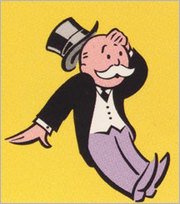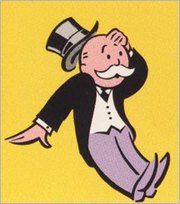What is post-modernism? Well it orginates in Modernist art of the decadence; in the Fin de Siecle of the 19th century.
Post modernism supercedes modernism with the invasion of the dialectical concisouness of Imperialism/Anti-Imperialism when the post WWII colonial/colonized world enters the space of capitalist decadence and speaks.
It is the dialectical result of the West's fascination with and creation of Orientalism which results in modernism and thus post-modernism;
the authentic Oriental voice's revenge.POSTMODERNISM / FIN DE SIECLEIt is interesting to reread
Ihab Hassan in this regard. Hassan's first book, after all, was called
The Literature of Silence (1967), and made the case for a "new literature" written in the wake of Dachau and Hiroshima, a literature whose "total rejection of Western history and civilization" leads either to the apocalyptic violence and obscenity of a Henry Miller or a Norman Mailer or the silence, randomness, and indeterminacy of Samuel Beckett or John Cage. By 1971, Hassan referred to this "change in Modernism" as Postmodernism and drew up the first of his famous lists or tables, a table made up of binary oppositions :
Modernism | Postmodernism |
| 1. Urbanism | 1. The Global Village (McLuhan), Spaceship Earth (Fuller), the City as Cosmos--Science Fiction. Anarchy and fragmentation. |
| 2. Technologism |
| 2. Runaway technology. New media, art forms. Boundless dispersal by media. The computer as substitute consciousness or extension of consciousness. |
| 3. Elitism | 3. Antielitism, antiauthoritarianism. Diffusion of the ego. Participation. Community. Anarchy. |
| 4. Irony | 4. Radical play. Entropy of meaning. Comedy of the absurd. Black Humor. Camp. |
| 5. Abstraction | 5. New Concreteness. Found Object. Conceptual Art. |
| 6. Primitivism | 6. Beat and Hip. Rock Culture. Dionysian Ego. |
| 7. Eroticism | 7. The New Sexuality. Homosexuality , Feminism, Lesbianism. Comic pornography. Repeal of Censorship |
| 8. Antinomianism | 8. Antinomianism. 8. Counterculture. Beyond alienation. Counter. Beyond Law. Non Serviam. Western "ways." Zen, Buddhism, Hinduism the occult, apocalypticism. |
| 9. Experimentalism | 9. Open form, discontinuity, improvisation, Formal innovation. New language. Antiformalism. Indeterminacy. Aleatory Structure. Minimalism. Intermedia. |
Postmodernism, Etc.: An Interview with Ihab Hassan Al-Ahram Weekly | Opinion | Preface to OrientalismOrientalism
A website devoted to the controversies surrounding Orientalism and Western representations of Islam and the Arabs. Located at www.orientalism.org.
A symphony of civilizationsChina's re-emergence - there is no "China rise", but only China's restoration to its historical position - is already having considerable impact on the global village. Understandably, observers and analysts discuss the nature of Beijing's behavior on the international scene. Will China behave like an empire trying to dominate and extend a pax Sinica, or act as a cooperative force working for a foedus pacificum, a league of peace, to use Immanuel Kant's expression (Perpetual Peace, 1795)?
Lolita and BeyondEpistemically I am trying to see how this mutation of Orientalism to Area Studies to active privatization of knowledge production (pretty much on the model of the privatization of certain aspects of the US military, such as intelligence gathering and torturing people) actually works. Meanwhile, I am also trying to keep a record of who is saying and doing what in these terrible times—for these criminal comprador intellectuals will have to be held historically accountable for what they now say and do.
What lies beneathThe legacy of Edward Said's 1978 book Orientalism, in which he argued that the west possesses a monopoly on how "Arabo-Islamic peoples and their culture" are viewed, was the subject of debate at the British Museum. Historian and novelist Robert Irwin kicked off by attacking what he decribed as Said's falsification of the past and poor understanding of Arabic, and argued that his "revolutionary" assertions were in fact part of longstanding Muslim and Marxist critiques.A Marxist Critique of 'Third World. [We] could start with a radically different premise: namely the proposition that we live not in three [or more] worlds but in one; that this world includes the experiences of colonialism and imperialism on both sides of [the] global divide; that societies in formations of backward capitalism are as much constituted by the division of classes as are societies in the advanced capitalist countries; that socialism . . . is simply the name of a resistance that saturates the globe today, as capitalism itself does; that the different parts of the capitalist system are to be known not in terms of a binary opposition but as a contradictory unity-with differences, yes, but also with profound overlaps. The world [is] united not by liberalist ideology [or humanistic universalism] but by the global operation of a single mode of production, namely the capitalist one, and the global resistance to this mode, a resistance which is itself unevenly developed in different parts of the globe.
Tribute to India in world’s oldest caves
There is an Indian chamber in the Jenolan caves, which are said to be the world's oldest discovered open caves, according to cave-dating research published by Australian geologists. “In the early 20th century, orientalism was a big theme in western societies, especially in the British Empire. Early cave explorers called it the Orient cave because of the red colour. It contains the Indian Chamber, Persian Chamber and the Egyptian Colllanade.
It was discovered in 1904,” explains Dr Armstrong Osborne, a senior lecturer at the University of Sydney.
A five-year study has shown that the limestone caves, which each year attract thousands of tourists, including Indian visitors, date back more than 340 million years.
Napoleon on the Nile at the Dahesh Museum of Art Initiated under the patronage of the young General Napoleon Bonaparte as he invaded Egypt in 1798, and completed in 1829 during the reign of King Charles X, the Description was among the most significant, and certainly the most tangible, consequences of the French military’s occupation of Egypt (1798-1801). Not only did it form the foundation for the modern discipline of Egyptology, but its large and magnificent plate illustrations influenced the course of "Egyptomania" and “Orientalism” in western fine and decorative arts for two centuries.
Gallic grandeur
Where Brown really excels is in the description of Flaubert's voyage to Italy and Egypt (1849-51) with his close friend Maxime du Camp and a heap of photographic equipment. Flaubert was, like many of his contemporaries, hooked on orientalism, which included an early version of sexual tourism as well as an astonished revelling in what is now mostly lost, although even then the railway and western trousers were already creeping in (Flaubert travelled by rail as early as 1843, but favoured Turkish robes). Brown emphasises Flaubert's excellent horsemanship, and the image of him galloping across moonlit African plains makes it easier to understand why he spent so much of his life recreating not just a banal Normandy, but a lost and splendid antiquity, most memorably in his novel of Carthaginian magnificence and cruelty, Salammbo (1862).Collection of Orientalist Imagery Reveals Roots of American Views ...The imagery has long been appropriated for use in American film posters, cigarette packs, pulp fiction and popular music: scantily clad harem girls, tyrannical despots and turbaned mystics have personified an imagined Middle East in the popular culture. Hundreds of objects reflecting that imagined realm has just wrapped up its first run at the University of California at Los Angeles. "Seducing America: Selling the Middle Eastern Mystique," an exhibit of Middle Eastern-inspired ephemera, is about to be launched as an extensive on-line data base complete with music samples, selected film clips and a comprehensive assortment of "Middle Eastern Americana". There are artifacts such as sheet music, souvenirs, book jackets and consumer goods, many bearing Middle Eastern insignias, and the accompanying advertisements which range from the crass to the cartoonish. Objects included comic books from the 1930s, pulp fiction book covers with titles such as "Desert Madness" and "Spicy Adventures," video games such as "The Prince of Persia," vintage sheet music for songs including "The Sheik of Araby" and "Rebecca Came Back from Mecca," photos of topless women on the covers of CDs, fierce warriors on the covers of DVDs, "Turkish" tobacco products, Egyptomania films, and various and sundry consumer items such as Palmolive beauty products, Ben Hur flour, Sheik condoms - and a couple of Shriner fezzes.
Noble Dreams Wicked Pleasures Orientalism in America, 1870-1930Indeed, one of the fascinations with Orientalism is how nicely it blends into other artistic styles of the 19th Century such as Pre-Raphaelism and Art Nouveau as well as the Aesthetic Movement. Orientalism, Pre-Raphaelism and Art Nouveau are various manifestations of lush, richly embued, symbolic decorative aesthetics, often tinged if not overwhelmed by a sense of history and prior historic periods. The Aesthetic Movement, of course, emerged from these influences to produce a "modern" style based on them.
In his excellent essay, Oleg Grabar finds the "roots" of American Orientalism in "the Protestant search for the space of the biblical revelations," European aristocratic taste, popular culture in freemasonry and other fraternal organizations, and "the spirit of skeptical curiosity and adventure.

Also See:Find blog posts, photos, events and more off-site about:
modernism, literature, art, fin-de-sciecle, 19thcentury, symbolism, post-modernism







